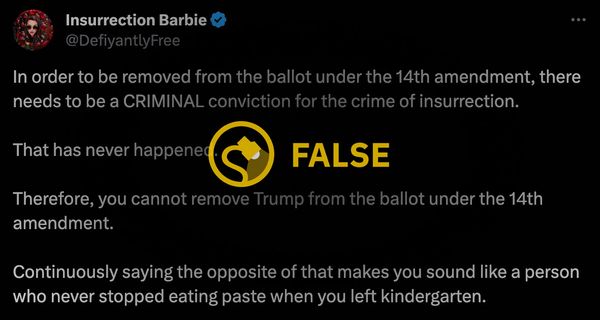On Dec. 28, 2023, a user on X made a post falsely claiming that a reading of the 14th Amendment of the U.S. Constitution showed that former U.S. President Donald Trump would need to be convicted of insurrection in order to be removed from the ballot for the 2024 election.

The post in question read as follows:
In order to be removed from the ballot under the 14th amendment, there needs to be a CRIMINAL conviction for the crime of insurrection.
That has never happened.
Therefore, you cannot remove Trump from the ballot under the 14th amendment.
Continuously saying the opposite of that makes you sound like a person who never stopped eating paste when you left kindergarten.
The user's post and its incorrect information ended with a last line that apparently remarked about users who post incorrect information.
The data in the post did not square with a reading of the 14th Amendment or the nonpartisan Congressional Research Service's (CRS) study of the text.
What Is This About?
Trump was indicted on Aug. 1 on four felony conspiracy counts in special counsel Jack Smith's 2020 election interference case. In a statement delivered on the same day, Smith called the Capitol riot of Jan. 6, 2021 "an unprecedented assault on the seat of American democracy."
"As described in the indictment, it was fueled by lies," Smith continued. "Lies by the defendant targeted at obstructing a bedrock function of the U.S. government, the nation’s process of collecting, counting and certifying the results of the presidential election."
On Dec. 19, the Colorado Supreme Court declared Trump would be removed from the state's ballot, citing a clause in Section 3 of the 14th Amendment.
Nine days later, Maine’s Democratic Secretary of State Shenna Bellows also removed Trump from the state's primary ballot, citing the same clause.
What Does the 14th Amendment Say?
Section 3 of the 14th Amendment reads as follows:
No person shall be a Senator or Representative in Congress, or elector of President and Vice-President, or hold any office, civil or military, under the United States, or under any State, who, having previously taken an oath, as a member of Congress, or as an officer of the United States, or as a member of any State legislature, or as an executive or judicial officer of any State, to support the Constitution of the United States, shall have engaged in insurrection or rebellion against the same, or given aid or comfort to the enemies thereof. But Congress may by a vote of two-thirds of each House, remove such disability.
When Was the 14th Amendment Enacted?
Findings published by the CRS, that also were cited in similar reporting by NBC News, laid out more information about the history of Section 3:
Enacted in the aftermath of the Civil War, Section 3 seems specifically designed for the Reconstruction Era but may be applicable to modern times as well. Section 3 was for the most part used only for the short period between its ratification and the 1872 enactment of the Amnesty Act. The Amnesty Act removed the disqualification from most Confederates and their sympathizers and was enacted by a two-thirds majority of Congress in accordance with the terms of Section 3. Some argue the Amnesty Act operates retrospectively. In a recent case, Cawthorn v. Amalfi, discussed in this Legal Sidebar, the U.S. Court of Appeals for the Fourth Circuit found that the act does not apply to later insurrections or treasonous acts.
Is a Criminal Conviction Needed for Ballot Removal?
The report from the CRS specified, "Section 3 of the Fourteenth Amendment does not expressly require a criminal conviction, and historically, one was not necessary."
Further, the report laid out the history of the usage of Section 3:
Reconstruction Era federal prosecutors brought civil actions in court to oust officials linked to the Confederacy, and Congress in some cases took action to refuse to seat Members. Congress last used Section 3 of the Fourteenth Amendment in 1919 to refuse to seat a socialist Congressman accused of having given aid and comfort to Germany during the First World War, irrespective of the Amnesty Act. The Congressman, Victor Berger, was eventually seated at a subsequent Congress after the Supreme Court threw out his espionage conviction for judicial bias.

